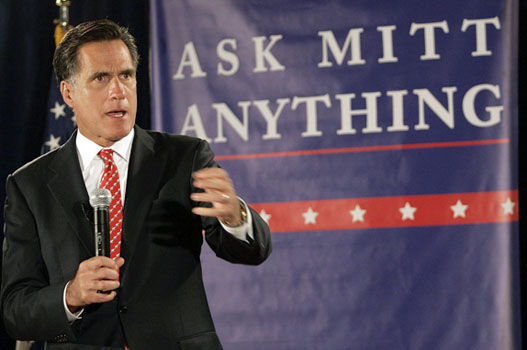Does Romney’s America Include Non-Believers?
 David Brooks has a sober and thought-provoking take on Mitt Romney’s “Mormon speech,” simultaneously praising its intricate weaving of philosophy and worrying that his method of arguing for inclusion of Mormons in the political sphere was at the cost of excluding non-believers.
David Brooks has a sober and thought-provoking take on Mitt Romney’s “Mormon speech,” simultaneously praising its intricate weaving of philosophy and worrying that his method of arguing for inclusion of Mormons in the political sphere was at the cost of excluding non-believers.
When this country was founded, James Madison envisioned a noisy public square with different religious denominations arguing, competing and balancing each other’s passions. But now the landscape of religious life has changed. Now its most prominent feature is the supposed war between the faithful and the faithless. Mitt Romney didn’t start this war, but speeches like his both exploit and solidify this divide in people’s minds. The supposed war between the faithful and the faithless has exacted casualties.
The first casualty is the national community. Romney described a community yesterday. Observant Catholics, Baptists, Methodists, Jews and Muslims are inside that community. The nonobservant are not. There was not even a perfunctory sentence showing respect for the nonreligious. I’m assuming that Romney left that out in order to generate howls of outrage in the liberal press.
The second casualty of the faith war is theology itself. In rallying the armies of faith against their supposed enemies, Romney waved away any theological distinctions among them with the brush of his hand. In this calculus, the faithful become a tribe, marked by ethnic pride, a shared sense of victimization and all the other markers of identity politics.
In Romney’s account, faith ends up as wishy-washy as the most New Age-y secularism. In arguing that the faithful are brothers in a common struggle, Romney insisted that all religions share an equal devotion to all good things. Really? Then why not choose the one with the prettiest buildings?
Indeed. The problem with the secularization of religion is that it winds up being insufficiently secular and insufficiently religious.
Brooks is also right that non-believers are more excluded from our process than even aggrieved religious groups like Mormons and Muslims. As noted here months ago, an atheist would have a much harder time getting elected president than a homosexual, black, or Hispanic — let alone a Mormon.
Memeorandum rounds up the blogger reactions to Brooks’ column. Most, like Ron Beasley, seem to agree with Brooks.
An exception is Red Stater Hunter Baker (who doesn’t appear to have read Brooks’ column) takes the opposite view, though: “The United States has traditionally been a nation that recognizes freedom must be paired with religion and morality if it is to persevere in political society. Mitt said it. Libertarians need to hear it. So do secularists.”
While there’s not much question that the Protestant Reformation played a role in the rise of democratic governance in the West, it’s far from clear that religion is necessary for freedom. Indeed, it’s difficult to think of a free theocracy.
The Washington Post weighing in on the question this morning with an editorial entitled, “No Freedom Without Religion? There’s a gap in Mitt Romney’s admirable call for tolerance.”
Where Mr. Romney most fell short, though, was in his failure to recognize that America is composed of citizens not only of different faiths but of no faith at all and that the genius of America is to treat them all with equal dignity. “Freedom requires religion, just as religion requires freedom,” Mr. Romney said. But societies can be both secular and free. The magnificent cathedrals of Europe may be empty, as Mr. Romney said, but the democracies of Europe are thriving.
“Americans acknowledge that liberty is a gift of God, not an indulgence of government,” Mr. Romney said. But not all Americans acknowledge that, and those who do not may be no less committed to the liberty that is the American ideal.
The estimable John O’Sullivan, though, thinks Brooks and others are reading something into Romney’s message that was not there.
The religious liberty celebrated by Romney plainly entails the liberty to be non-religious. What Romney is opposing in those sections of the speech that seem to concern the culture wars is an obligation to be non-religious in the public square.
David’s arguments seems to be that if religious people were to unite against secularists to fight the their joint battles more effectively in the culture war, that would be an aggressive, divisive, and regrettable act. But that argument itself rests on the unstated assumption that the culture wars would stop if religious people stopped fighting them. In fact the culture wars began because the Left employed the courts to change America on everything from abortion to school prayer to gay marriage. This has not stopped. The obligation to be non-religious in the public square, though a very recent invention of liberal philosophers, is treated seriously in legal arguments and court decisions today.
So why shouldn’t religious people, while affirming the right to be non-religious, organize to defend their joint beliefs and interests in the way deplored by David?
No reason at all, of course. Indeed, while I would prefer that public policy decisions be decided on purely secular grounds, religious convictions are ultimately no less legitimate motivation for policy preferences that economic interest, party loyalty, or “we’ve always done it this way.”
It seems inevitable, though, that the overwhelming majority who are religious will mount their fight to protect their cultural values (even those shared by many secularists) on Us vs. Them grounds.
Further, as Eric Klee reports, Romney is thus far refusing to distance himself from the Brooksean interpretation.
A spokesman for the Mitt Romney campaign is thus far refusing to say whether Romney sees any positive role in America for atheists and other non-believers, after Election Central inquired about the topic yesterday.
It’s a sign that Romney may be seeking to submerge evangelical distaste for Mormonism by uniting the two groups together in a wider culture war. Romney’s speech has come under some criticism, even from conservatives like David Brooks and Ramesh Ponnuru, for positively mentioning many prominent religions but failing to include anything positive about atheists and agnostics.
Indeed, the only mentions of non-believers were very much negative. “It is as if they’re intent on establishing a new religion in America — the religion of secularism. They’re wrong,” Romney said, being met by applause from the audience.
Romney’s strategy, if indeed it was intentional, is a politically sound one. The numbers favor pandering to the religious to the exclusion of non-believers; that’s especially so in the Republican primaries. It’s not the way to national unity but that’s generally well behind winning votes in a politician’s calculus.






Romney’s inherent problem is that he is trying to convince the extreme conservatives evangelicals that he believes religious beliefs will not influence his behavior as president.
But that is exactly their goal. They want to use the power of government to impose their religious beliefs on others.
That is what has changed since Kennedy ran against anti-Catholic beliefs.
With this in mind Romney is in a no win situation.
You’ll notice he also didn’t mention the satan worshipers, so by the same logic of the Washington Post, by failing to mention it he showed not even “perfunctory inclusion” of the satan worshipers. It must all be part of his secret plan to make the leftist media howl.
“”[1] it’s far from clear that religion is necessary for freedom.[2] Indeed, it’s difficult to think of a free theocracy.””
“””””””””””””””””””””””””””””””””””””””””””””””””‘
#2 is a certainly a non sequitur.
While it would seem that religion would be necessary for a theocracy, the secularists are in the process of proving otherwise.
Religion is necessary, and Theocracy is anathema to freedom.
It is not simply a failure to include the secular in positive statements. He did mention the non-religious in specifically negative ways.
He argues against a religious test for him while advocating a different type of religious test for others. Secular people are bad for not wanting government support of religion in schools or courts, Muslims can be excluded for consideration in his cabinet because of their numbers in the US, but anything negative said about his religious beliefs is unjust.
Spencer;
While some of what you say has merit,
your second sentence is merely Knee-jerk in nature and without foundation in reality.
A major GOP candidate for president regards those smart enough not to be religious as second class citizens…
And?
Who can really be surprised by this, given the state of things today?
Sorry, it’s just hard to get worked up about this when it’s been the case for a long long time.
YAJ manages to inadvertantly show why I don’t worry too overly much about the stupid theocrats in america: they are always too busy hurting each other to do much damage to the rest of us.
I am reminded of a cartoon by Gary Larson, in the Far Side series. There is a hunter aiming his gun at a couple of bears. We see down the sights, and the bear in the crosshairs is frantically waving to the hunter and pointing him toward the other bear.
Romney seems to be in the crosshairs of the religious bigots, and his efforts seem to be a plea for them to accept him in their fold, so that together they can go to war against the real enemy, the non-believers.
As others have noted, the problem is most certainly not that he failed to mention non-beleivers, it is that he explicitly outlined his vision for an American community of ideas, with faith as its defining feature.
Most of the progress that has ever been achieved in terms of the advancement of liberty has come about in opposition to religion, not because of it.
In fact, were it not for the fact that America was settled by a diverse group of denominations, making the primacy of any one problematical, and thus necessitating a compromise to democratic reality, we would probably had an established church in this country, as we did in some of the early colonies.
Connecticut had an established church until 1818, Massachusetts until 1833. There were locally established churches that persisted much, much longer.
BTW in Utah the Mormon church was established at least to some degree long after the Civil War.
Thanks for the details, Dave.
I think it just drives home the point that the notion of religious liberty for all, as opposed to just for one’s own group, arose from pragmatic democratic compromise, not from any inherint religious principle.
Maybe we could just consider the notion of religious liberty to be the 18th century version of multi-culturalism.
But who, in the context of a presidential campaign, would make an argument like that? 🙂
One of the worse things our founding fathers could envision were the Puritans in New England or the Quakers in Pennsylvania or the Catholics in Maryland or the Cavaliers in Virginia, etc., etc., having the power to impose their beliefs on them –if they belonged to another group. Moreover, they had just observed 200 years of religious strife in England that at times actually turned into a civil war as first one group and then the other used the power of the crown to impose their beliefs on the others.
This is why they wrote the Constitution they way they did. It is also why the religious right is completely wrong and so dangerous.
There are no such things as non believers. It is just a matter of whether or not someone chooses to worship God or be God. “You are either with Him or against him.” There is no middle ground. We have seen far too many “atheists” who profess to not believe in a god, spend their entire lives fighting God – hence their claim that God doesn’t exist.
Their gods may be the almighty state, or science, or sex, or wealth, or power, or knowledge, but it usually comes down to the fact that the godless chose self to have complete faith in.
That’s some high density bull%#%^ you got there, Don. You might want to look into getting some fiber in your diet to help keep it from getting impacted like that.
Hunter of redstate sure seems like a weasel. Rather than defend the idea that secularists are subversive to the body politic, he pulls out a red herring and defends the true but banal and uninteresting thesis that we’ve historically been religious.
Disingenuous hackery at its finest.
So first Romney didn’t know how long it had been since the Red Sox had won the World Series.
Now he says he’d rather set up society with Osama bin Laden rather than
Ted Williams???
Wow, the authenticity just drips off of him, doesn’t it? Not. I thought he was supposed to be like Reagan but he’s starting to seem more like Kerry. Given that Romney is so into “>
quotas for deciding who should be in government, perhaps he needs to take a look at the fact that there are a whole lot more non-religious people in America (around 15%, the third largest group after Catholics and Baptists) than there are Mormons. That he responds to anti-Mormonism by picking on others rather than denouncing or at least distancing himself from bigotry is pathetic.
Unreligious people in the next decade or two will probably be like gay in the 2000s. The paranoia and bigotry ebb away and suddenly you find out that there are a lot more of them including people you know than you ever realized before.
Well, as an agnostic, I have no problems with Ronmey – that is, of course, not the narrative the MSM wishes upon you.
There is plenty of proof here that religious bigotry is not confined to the “religious”, but thrives among those who claim to be “non-religious”, who are not so much uninformed as misinformed by it.
When you see the very act of not believing in your God as aggression against your God and by extension you. You define the atheist as an aggressor and then use this aggression as excuse for your ‘counter’ aggression. That’s quite a nice little cocoon of circular logic you have built for yourself.
Just curious.
Does “with Him or against Him” leave the Hindus and animists in or out? Are you with them or against them?
Is it OK to be for Her or It?
What about the satanists and wiccans? Does it have to be the right Him/Them or will any Him/Them do?
Ummm guys?
Before you go after Romney, consider targeting first John Adams….